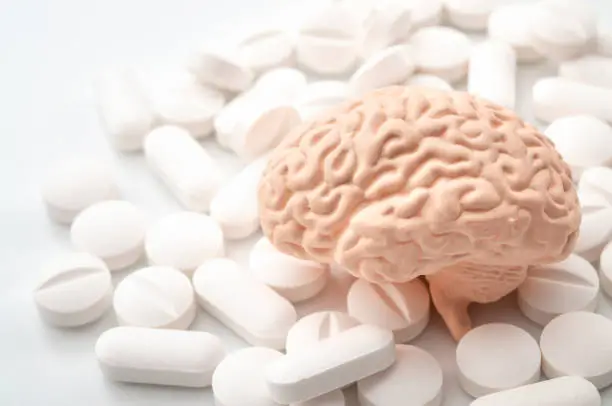A neurodevelopmental disorder, Attention Deficit Hyperactivity Disorder (ADHD) impacts millions of children and adults globally. Individuals with ADHD often struggle with maintaining focus, managing impulsive behaviors, and organizing their thoughts and tasks. These challenges can impact personal, academic, and professional aspects of life. While behavior therapy and prescription medications are the traditional treatments for ADHD, an increasing interest surrounds nootropics for ADHD , which are substances aimed at enhancing cognitive performance.
This article explores nootropics in depth, examining their potential, types, risks, and how they might help manage ADHD symptoms. By understanding both the promise and limitations of nootropics, individuals and caregivers can make informed decisions about their role in ADHD management.
What Is ADHD?
ADHD is a complex condition characterized by symptoms such as inattention, hyperactivity, and impulsivity. The disorder often manifests in childhood, but for many, the symptoms persist into adulthood. Common challenges faced by individuals with ADHD include:
- Difficulty Concentrating : Sustaining attention on tasks can be overwhelming.
- Disorganization : Forgetfulness and a lack of structure often disrupt daily activities.
- Impulsivity : Acting without thinking through the consequences.
- Hyperactivity : An inability to remain still, often coupled with feelings of restlessness.
While the exact causes of ADHD are not fully understood, research points to a combination of genetic, neurological, and environmental factors. ADHD is typically managed through a combination of behavioral therapies, lifestyle adjustments, and medications.
Nootropics: An Overview
Nootropics, often referred to as “smart drugs,” are substances that enhance brain function. They can improve memory, focus, attention, and overall cognitive performance. Nootropics can be classified into two broad categories:
- Prescription Nootropics : These include medications like stimulants and non-stimulants used to treat ADHD and other neurological conditions.
- Over-the-Counter (OTC) Nootropics : These include natural supplements, herbal remedies, and synthetic compounds available without a prescription.
The use of nootropics for ADHD is gaining attention as individuals seek alternatives or supplements to traditional treatments. However, it is essential to understand how these substances work, their potential benefits, and their risks.
How Prescription Nootropics Work for ADHD
Prescription nootropics are the primary line of treatment for ADHD. These drugs are designed to address the neurological imbalances associated with the condition.
Stimulant Medications
Stimulants are among the most effective medications for ADHD. They increase dopamine and norepinephrine levels in the brain, which are critical for focus and attention. Common stimulant medications include:
- Amphetamine/Dextroamphetamine (Adderall) : This medication boosts neurotransmitter activity, improving focus and reducing hyperactivity.
- Methylphenidate (Ritalin, Concerta) : Known for its effectiveness, it helps regulate attention and impulse control.
- Lisdexamfetamine (Vyvanse) : A long-acting stimulant that provides consistent symptom relief throughout the day.
- Dextroamphetamine (Dexedrine) : Improves concentration and reduces impulsive behavior.
Non-Stimulant Medications
For individuals who cannot tolerate stimulants or experience severe side effects, non-stimulants provide an alternative. These medications work differently but are effective in managing ADHD symptoms. Examples include:
- Atomoxetine (Strattera) : A norepinephrine reuptake inhibitor that improves focus and impulse control.
- Guanfacine (Intuniv, Tenex) : Helps regulate emotional responses and reduce hyperactivity.
- Clonidine (Kapvay) : Primarily used for its calming effects.
- Viloxazine (Quelbree) : A newer non-stimulant option showing promising results for ADHD.
While these medications are effective, they can have side effects such as appetite suppression, insomnia, irritability, and cardiovascular issues. Therefore, exploring alternative options like OTC nootropics is increasingly appealing to some individuals.
Over-the-Counter Nootropics for ADHD
OTC nootropics include synthetic supplements and natural substances that aim to improve cognitive function. While they are not as potent as prescription medications, they offer potential benefits with fewer side effects. These nootropics are widely accessible and can be purchased without a doctor’s prescription.
Common OTC Nootropics
- Caffeine : Found in coffee, tea, and energy drinks, caffeine enhances alertness and focus. However, excessive consumption can lead to anxiety and jitteriness.
- L-Tyrosine : An amino acid that supports dopamine production, improving focus and mental performance under stress.
- L-Theanine : Known for promoting relaxation without drowsiness, it can be paired with caffeine for enhanced focus.
- Creatine : A compound often associated with physical performance, creatine also shows potential in improving cognitive clarity.
- Phosphatidylserine : A phospholipid that supports brain health, it may improve memory and concentration.
- Citicoline : Enhances brain energy metabolism and may aid in attention and focus.
- Acetyl L-Carnitine : Believed to improve memory and attention, often used in age-related cognitive decline.
Herbal Nootropics for ADHD
Herbal nootropics have been used for centuries to enhance mental performance. These natural remedies are particularly appealing to individuals seeking holistic approaches to ADHD management.
Popular Herbal Nootropics
- Ginkgo Biloba : renowned for its capacity to increase blood flow to the brain, which improves focus and memory.
- Bacopa Monnieri : A traditional Ayurvedic herb that supports cognitive function and reduces anxiety.
- Rhodiola Rosea : An adaptogen that helps combat mental fatigue and improve focus.
- Panax Ginseng : Boosts energy levels and supports cognitive clarity.
- Ningdong : A Chinese herbal formula that shows promise in managing ADHD symptoms.
Emerging Nootropics: Modafinil and Piracetam
In addition to well-known nootropics, emerging substances like Modafinil and Piracetam are gaining attention for their cognitive-enhancing properties.
Modafinil
Originally developed for narcolepsy, Modafinil promotes wakefulness and improves cognitive performance. While not FDA-approved for ADHD, it is sometimes used off-label to enhance focus and attention.
Piracetam
Piracetam belongs to the racetam family of nootropics and works by modulating neurotransmitters like acetylcholine. Although research on its efficacy for ADHD is ongoing, it shows potential as a cognitive enhancer.
Risks and Considerations of Nootropic Use
While nootropics offer promising benefits, they are not without risks. Key considerations include:
- Lack of Regulation : Many OTC nootropics are not FDA-regulated, meaning their safety and efficacy are not guaranteed.
- Potential Side Effects : Even natural supplements can cause adverse effects, such as headaches, nausea, or gastrointestinal discomfort.
- Drug Interactions : Combining nootropics with prescription medications may result in harmful interactions.
- Variable Effectiveness : The benefits of nootropics can vary significantly among individuals.
Vitamins and Nutrients for ADHD Support
In addition to nootropics, certain vitamins and minerals can support overall brain health and complement ADHD management. These include:
- Vitamin B2, B6, and B9 : Essential for neurotransmitter production.
- Zinc and Magnesium : Aid in reducing hyperactivity and improving focus.
- Iron : Deficiency is linked to attention problems.
- Omega-3 Fatty Acids : Support brain health and reduce inflammation.
How to Choose the Best Nootropic for ADHD
Finding the right nootropic requires careful consideration. Steps to take include:
- Consult a Healthcare Provider : Always seek professional guidance before starting any new supplement.
- Research Ingredients : Look for evidence-based formulations with proven ingredients.
- Start Slowly : Introduce one nootropic at a time to monitor its effects.
- Evaluate Progress : Track improvements in focus, memory, and cognitive performance.
Do Nootropics Help ADHD?
Nootropics, particularly those targeting dopamine and norepinephrine production, can be beneficial for ADHD. While they may not replace traditional medications entirely, they offer supplementary benefits that enhance focus, attention, and mental clarity. Effectiveness varies, so monitoring individual responses is key.
Are Nootropics Safe for Children?
The safety of nootropics for children depends on the specific substance. Prescription medications like stimulants are rigorously tested for pediatric use. However, OTC nootropics lack extensive research in children, making their use potentially risky. Always consult a pediatrician before introducing nootropics to a child.
Can Nootropics Be Combined with Other ADHD Medication?
Combining nootropics with ADHD medication can enhance or potentially interfere with treatment. For instance, pairing L-Theanine with prescription stimulants may help reduce anxiety. However, improper combinations could lead to side effects or diminished efficacy. Consultation with a healthcare provider is essential.
Best Nootropics for ADHD and Depression
For individuals managing both ADHD and depression, nootropics that target neurotransmitter balance are particularly useful. Examples include:
- L-Tyrosine : Supports dopamine production, improving mood and focus.
- Rhodiola Rosea : Alleviates fatigue and promotes emotional well-being.
- Bacopa Monnieri : Reduces anxiety while enhancing cognitive performance.
- Omega-3 Fatty Acids : Supports brain health and alleviates depressive symptoms.
Conclusion
Nootropics for ADHD represent an exciting frontier in cognitive enhancement. Whether through prescription medications, OTC supplements, or emerging options like Modafinil and Piracetam, these substances offer potential benefits for individuals struggling with focus, attention, and mental clarity. However, it is essential to approach their use with caution, seeking professional advice and thoroughly researching options.
By integrating nootropics into a comprehensive ADHD management plan, individuals can explore new possibilities for improving cognitive function and achieving greater success in their personal and professional lives.

